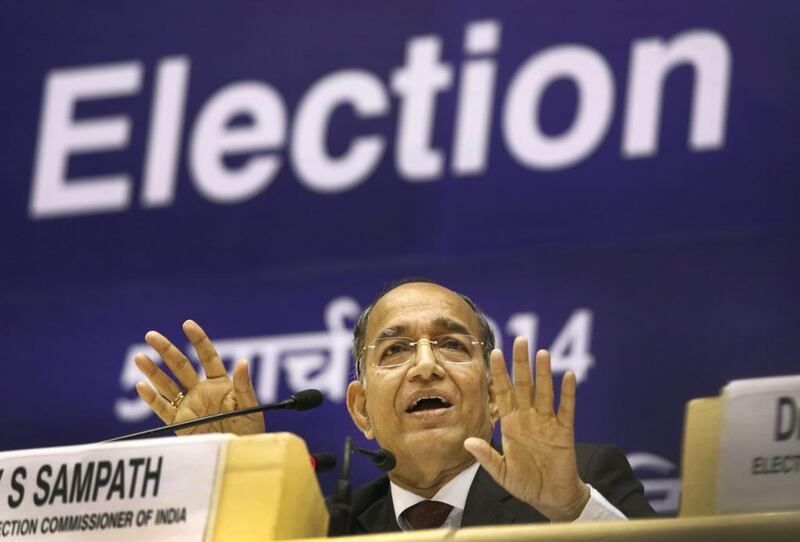NEW DELHI // India’s general election, the largest the democratic process the world has ever seen, will begin on April 7, election officials said yesterday.
About 814 million people will be eligible to vote in the poll, which is predicted to bring dramatic changes to the political landscape. Polls say Narendra Modi and his Bharatiya Janata Party (BJP) are set unseat the Congress party, which has held on to power for the past 10 years.
A Pew Research Centre survey, which polled 2,464 voters with a sampling error margin of four percentage points, last week showed that 70 per cent of Indians are unhappy with the state of the country. Moreover, 63 per cent of respondents said they wanted the BJP, the main opposition party, to lead the next government.
“Poll bugle has been sounded!” said Mr Modi, the BJP’s prime ministerial candidate, on Twitter. “2014 polls are a historic opportunity to lay foundation of a developed India.”
Only 19 per cent of people said that they wanted the Congress to continue in power.
“We don’t believe in opinion polls, because we have worked for the people and have a lot to show for it,” Kapil Sibal, the Congress’ law minister, said. “We have done historic things.”
While Mr Modi, the chief minister of Gujarat, is ahead in the polls, he remains a divisive figure. He has been accused of failing to control, or even abetting, anti-Muslim riots in his state in 2002.
About 2,000 Muslims died during the riots.
Analysts say these elections are hard to predict. The emergence of the Third Front and the Aam Aadmi Party introduced fresh competitors into what has largely been a two-party race for the past two decades.
The Third Front, a loose assembly of the Left and regionally powerful parties, might find more local traction than either the Congress or the BJP. The Aam Aadmi Party, only a year and a half old, has ignited the imagination of voters by campaigning on a strong anti-corruption platform.
In December, the Aam Aadmi Party won 28 out of 70 seats in elections to the Delhi legislature, briefly forming the government that ran India’s capital. The party now seeks to extend its footprint across the nation.
“If the Aam Aadmi Party manages to win even 30 seats, it’ll upset everybody’s calculations,” said Peer Mohamed, a Chennai-based political analyst. “They can really be a game-changer. This is why nobody can afford to write them off.”
Between the Third Front, the Congress and the BJP, Mr Mohamed said, the competition for the largest number of seats in the Lok Sabha, the lower house of parliament, would be fierce.
Everything about India’s general election is massive in scale.
Voter turnout is expected “to touch 70 per cent or even cross it”, HS Brahma, an election commissioner, told the DNA newspaper on Tuesday. “The [election commission] has done work on a massive scale to educate voters, especially the vulnerable ones – illiterate, poor, marginalised – as well as women and youth.”
The mammoth process requires such complex logistics and security arrangements that the election will be conducted in nine phases, from April 7 to May 12.
Officials have estimated that cost of India’s 16th general election will be 35 billion rupees (Dh2.08bn), compared to the 14bn rupees spent on the 2009 election and the 104.5 million rupees spent on India’s first election, in 1952.
About 930,000 polling stations will be set up across the country, so nobody will have to travel more than 2 kilometres to vote. Roughly 1.2 million electronic voting machines will be deployed, and a security force of 120,000 personnel will guard polling stations.
VS Sampath, India’s chief election commissioner, said yesterday that cash bribes for votes remained one of the biggest challenges to Indian democracy.
The election schedule is structured around school examinations, religious holidays, harvest seasons and the weather. The first two states to vote will be Assam and Tripura. Uttar Pradesh, with a population of 200 million that elects 80 members to the 543-seat Lok Sabha, the most of any state, will vote on six dates.
The announcement of the election schedule puts into play the Model Code of Conduct, which forbids the government from making any decisions that may be used to sway voters.
The code also lays down the rules for campaigning, setting ceilings for expenditure and forbidding mudslinging against political opponents.
The results are expected to be announced on May 16.
ssubramanian@thenational.ae





